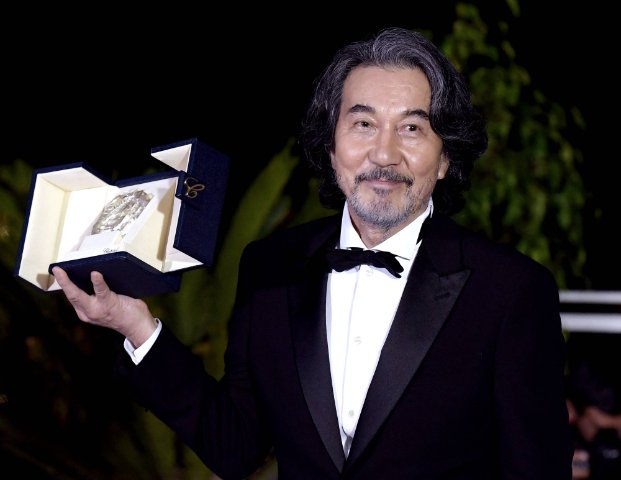Wim Wenders at Lincoln Center
Film Festival Premieres The Tokyo Toilet
By: Susan Hall - Oct 13, 2023
Wim Wenders new film, The Tokyo Toilet, had its New York premiere at the New York Film Festival in Lincoln Center in New York.
A Tokyo toilet cleaner, Hirayama, is played brilliantly and subtly by Yakusho Koji. Hirayama steps out of his small Tokyo home and looks up at the sky. Another perfect day begins. Now. Not Next. These phrases pepper the film often.
We will see a myriad of variations on his smile. Yet the broadest fullest one starts each workday as Hiryama emerges into the alley in front of his home. He loves trees as much as the American author Richard Powers does. Images of trees, their branches, the sun shining through them, these are the focus of his photography, which gives him much lunchtime pleasure.
Hirayama is on his way to work cleaning public toilets in the Shibuya section of Tokyo. Just as his morning ritual at home will be repeated over and over again, increasingly abbreviated, with the stroke of a razor and a splash of water coming to signify washing and shaving, so too will the gestures of cleaning a toilet be abbreviated over film time.
Returning recently from the Tippet Rise Art Center in Fishtail, Montana, I was haunted by architectural sculptures that dot the landscape of a 12,500 acre ranch. Ensamble Studio of Spain, the Pritzger honoree Francis Kere of Burkina Faso, and Stephen Talasnnik are among the artist/architects represented in small sculptures which are used both as shelter and also small performance spaces.
Wim Wenders, surely with a wink and also a sure, graceful visual presentation, gives us the small architectural structures that dot the Shibuya section of Tokyo. These are the public toilets that have been designed by many of Japan’s foremost architects, joined by other prominent architects from around the world. We have to remember that for the Japanese, the toilets are a symbol of the country’s hospitality culture.
This film began as a documentary on the toilets. That film did not happen. Instead, we have The Tokyo Toilet, with the theme song Perfect Days from Lou Reed. It is a tribute to one of Wenders’ fallen angels, Yasujir Ozu, who Wenders credits as his foremost influence. Both artists had early experience with American filmmaking and developed their styles from an American filmmakers. (Famously when Ozu went for his first interview as a director in Japan, he told the studio head that he had only seen American films.)
Wenders has acknowledged his debt to Ozu. This film is another re-imagining. No one captures the quotidian with quite the style of Ozu, and now Wenders. A spiritual quality comes from repetition. Doctrine is absent. We rest only in ritual. Emptiness and silence abound.
Thirty-five years ago, Wenders returned to his home city of Berlin after several years working in America. He created Wings of Desire, a scriptless work in which the writer Peter Handke collaborated. Wenders is a director actors say Yes to. Peter Falk was thousands of miles away from the director when Wenders called to ask him to be a fallen angel. Falk asked not one question about the project. He simply said Yes.
Many of Japan’s most prominent acting talents said Yes to The Tokyo Toilet. The language (not Lou Reed's, not Nina Simone’s or the Animals for that matter) is Japanese. Wenders does not speak Japanese. Yet, even with a tight shooting schedule, he was able to communicate by gesture with Yakusho. One can imagine Wenders playing his own favorite music for the actor, gauging his response and then picking Lou Reed, Nina Simone, Van Morrison and so on. Familiar with these classics, we are taken to a special meeting place of East and West.
The magical combination of rootedness in detail and suspension in another world which entranced in Wings of Desire is effectively created in The Tokyo Toilet. Disdain for toilets is not on the same level as recovery from a devastating war, but the notion that we are 'one' is.
We do not need to know the back story, which is hinted at. Thoughts about it are fleeting when Hirayama's sister arrives in her black Lexus to pick up her daughter who has run away to her Uncle’s home. She has been told that Hirayama is working in Tokyo Toilets cleaning, but when she confirms this with her brother, her face crunches somewhere between disgust and sadness. This is the kind of miraculous expression Wenders elicits. Cinematographer Franz Lustig captures these expressions again and again. The topography of Yakusho’s face is portrayed closeup in repose. In the morning, he lies on his mat contemplating the day. Later in the evening, he is propped on an elbow reading William Faulkner by lamplight.
Familiar repetitions of driving sequences, highways, and restaurant visits are vintage Wenders. The combination of emptiness and quiet used to contrast with a noisy, busy urban environment is a position Wenders has often taken. The pace is slow but never loses the viewer. Nor can you disengage from the compelling central character and his interactions with a subordinate who is not up to the job of toilet cleaning. Dialogue with his young niece, who for a moment fills his solitary life, with the children he helps to leave the toilet, and the game of Tik, Tac, Toe he plays with someone who leaves a new move tucked behind a toilet each day. Hirayama responds with an X or O. (Before we used emojis, "X" and "O" were terms of affection).
Lustig celebrates the Toilet buildings, some made of wood like a house, others shaped like circles and swirls. One toilet has see-through walls so that visitors can be sure it is clean. When a person enters, the wall is smoked up and you can no longer see-through.
Always in the background are these delightful public buildings that house toilets. Why shouldn’t these arresting sculptures be available to everyone for the basic necessities of life?
Wenders is concerned that film elevates humans, and he helps to show a path to a more fulfilled existence. Pleasant toilets on perfect days seems like a good starting point. The film’s hero is treated with as much dignity as Wenders treats Pope Francis and Anselm Keifer.


